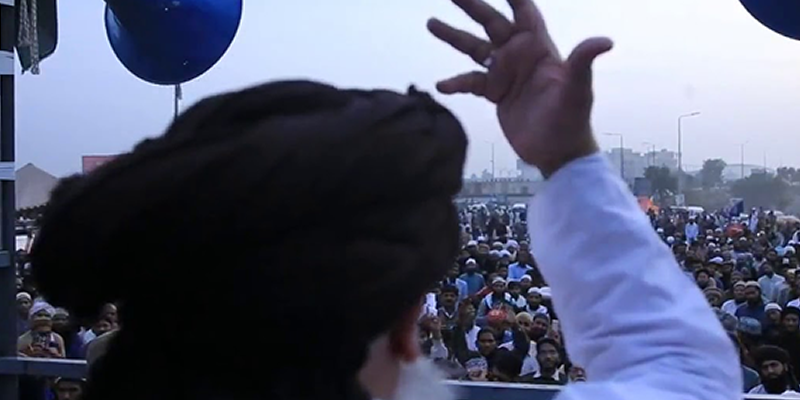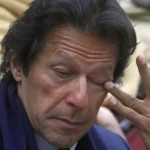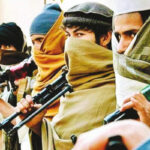People view the recent Faizabad fracas as an ugly event; an aberration that locked down the Capital City. The citizens of Islamabad were inconvenienced. They wanted the government to relieve them of their misery – nay, they demanded; the roads be cleared and the mullahs be sent packing. It did not matter to most how this was to be done but that it be done. No one really wanted to dirty their hands dealing with this ruckus, it was as if it was somebody else’s problem yet it was affecting everyone else. Its resolution became talk of town, the search was on for a quick fix, the courts took suo-moto notice and preachers galore, of every colour and every disposition, were called in to reason with the unreasonable. Finally the Army was called in; they did what they thought was best. The roads were cleared, no shots were fired, the mullahs sent back.
Pakistan has time and again been subjected to ideological crisis, its people are obsessed with saving Islam. Even King Farouk of Egypt was led to state that it seems Islam was born in Pakistan in 1947. The people of Pakistan talk of how ‘we conquered Spain’, deriving an association with history through the commonality of ideology and confusing it with nationality. We incite violence in the name of religion almost every day. We take offence to real or perceived insults at the drop of a pin and regardless where it occurred, go to the street to dismantle our own country in wanton rage. Governments have been found wanting in containing and controlling the genie that they let loose by morphing and distorting their own constitution over and over again and making it into an instrument of persecution and discrimination. Now we cannot differentiate between a sin and a crime anymore as our very religion has been hijacked by the unscrupulous who twist it and turn it, while society prances behind these divines, hooting encouragement as they bay for blood. Reason is sacrificed at the altar of emotion, as accusations born of rumour take on a life of their own; lynching becomes the norm and justice is dispensed by murdering our own governor. The government of the time did not even have the courage to say a prayer for their own governor in the parliament. This was the environment in which the Army was called in to save the government from its own machinations. It was a judgement call; should they have tried to address the much larger and real issue of a radical society or then diffuse what was an obviously difficult situation. They sensibly chose the latter.
Yet everyone was up in arms. A deal had been made, the mullahs had been appeased; there was disappointment that there had been no hell, fire or fury. Some demanded F 16s bombings like in FATA – why not, after all if it can happen there why not here. People fail to comprehend that even in FATA, where there was an organised armed resistance, there was no military solution. The military only creates an environment for the government to apply itself; it cannot shoot the government into relevance; that is for the government itself to manage. Faizabad was not about 2500 protesters as much as establishing the government’s moral writ after they lost credibility and allowed dissatisfaction to spread nationwide. The Army could not have done that even if it had killed every single protester in Faizabad. The Justice of Islamabad High Court was not satisfied, he was the same justice who earlier had been very upset with the violent clearance of Lal Masjid, now he was upset with the peaceful resolution at Faizabad. I suppose one cannot please some regardless of what one may do but it indicates what the Army had to deal with – damned if you do, damned if you don’t!
Conclusions are now broadcasted by our experts. Extremism has been given a boost, The Economist says Pakistan Army is undermining the Civil Government, Babar Sattar, a PMLn lawyer, calls it a reign of terror. Well we have seen these thing before: the Ahmadia riots of 1956 and Justice Munir Report on which no action was taken and the question of who is a Muslim and who is not, remained unanswered. Then Bhutto’s appeasement of the mullahs in declaring Friday as a holiday, nationwide prohibition and declaring Ahmadis as non-muslims, was done to save his own skin; it did not work. Zia’s reign of misguided righteousness that corrupted society rather than make them any holier resonates in the intolerance and extremism we witness even today. Handing over Swat to Sufi Muhammad is another aberration that we have survived where there is a parallel constitution that is technically still in vogue. Does anyone have the courage to throw that out? So having looked into the stuff we are made of and the people that we are, no, there is no indication of extremism or intolerance on the rise; it’s simply business as usual. There is no evidence that the State will be taken over by the Mullahs, they already dictate policies. Why don’t these same liberals talk of amending the constitution and separating religion from politics? Give religion the much greater status of a divine order rather allowing bigoted, uneducated people an opportunity to exploit it for personal pelf and privilege. What happened at Faizabad was a clear indication of no visible government and to expect the Army to fire fight every crisis that occurs due to the gerrymandering of a government that is totally lacking in capacity and capability, is being unfair. However, if that really is the way to go, then why be selective, let’s start with Model Town killings and let the Army resolve that first through military courts established on the insistence and direction of this parliament.
We, in Pakistan are incapable of regulating our traffic, we cannot manage our own garbage, we steal utilities, we litter everywhere, every office is dysfunctional, every institution irrelevant and yet we thing that there is a will and design to put the mullah in his place. In Pakistan anyone with a tin-can and a loud-speaker standing by the road can collect funds from this same fawning uneducated public through the former and spew hatred through the same public with the latter. We are good at making laws; NACTA and NAP are two such illustrations of slogans without substance. We have not been able to even enact the Madrassa reforms, we instead fund them by government initiatives, misusing the tax payers’ money and then we expect that by some miracle the mullah will be contained. We ourselves cultivate and organize various religious groups as part of the political process with each political party having its own nuisance groups. Yet here we want to pluck out one issue of the many issues that plague our lives, the one that is directly a glaring consequence of poor governance and want the Army to correct it but ignore everything else that had a role in causing it.
With all these issues, yet it is widely rumoured that we have a political government with a functional democracy, and if there is one and it is democratic, then, in the case of the Faizabad situation, it’s they who broke it, it is for them to fix it – politically or democratically, however they deem best. One is at pain to convince people to look at the larger picture, Faizabad is not an event; it is a phenomenon. The phenomenon is one where there is literally no application of law, no regulation and no management. Our government is neither political nor democratic, according to the Supreme Court, it is a gang of crooks driven by the rules of the mafia. The Constitution is a document to eloquently quote from but only where it suits the one quoting from it. It has no practical implication where society, the people or the State come into the equation; in fact it is irrelevant. This is the consequence of continuing to live with this aberration we continue to call a system of governance. We clash our cymbals in celebration of democracy where democracy has remained a mere label without any practical manifestation. In fact, religion and democracy in Pakistan have become a racket to exploit the State, its people and society. How does one explain the aberration of Maulana Diesel, chairman of the Kashmir Committee or maulvi Burqa, head honcho of Lal Masjid, both living off the State’s largesse and for doing nothing, the only thing they do best? Which country in the world allows such shameless people to live off the land and for no reasonable purpose or useful function? Where do people anywhere in the world allow a clown with a telescope loose on its people to decide their schedules for celebrations and events and then pay him for his troubles? Yet we as a society, a public and as citizens take all this in seriously and with solemn acceptance!! It is now for the people to decide, if this is what they want, then there will be many more Faizabads, in different ways and in different colours but it will not be because of extremism and intolerance but more on account of the total absence of governance. So it is amusing to see the chattering classes give their intelligent but aimless opinions on the micro-management issues of Faizabad, of what all happened and what did not, yet miss the huge elephant that is prancing before them; THERE IS NO GOVERNMENT.
If the Army had moved in under article 245, shot at the people and established order at Faizabad, yes, there may have been some who would have been convinced and others even happy but governance would not have been restored just as it is not restored even now, nor will it be in the future, if matters remain as they are. This will get worse by the day – anarchy, lynching, murder and exploitation of society. Army action would not have made it better but worse because the solution was never in enforcement of article 245 or military action. The solution squarely lay in NACTA, NAP, social de-radicalisation and reasonable Governance. Unless we recover our institutions and discover a government that has the political will and the moral capacity to act when it should, it will only get worse. This is what should be recognised by all instead of looking for every other reason under the sun for our woes; please recognise the reality of the situation – the Army is not Pakistan’s enemy, it’s your Army. As was famously said, you will always have an Army, if it’s not your own, it will be someone else’s.
Lt. General Tariq Khan (Retired), an erudite general from Pakistan’s Armored Corps and a decorated War Veteran, is an expert on critical issues related to Terrorism & Insurgencies. General Tariq Khan during the Battle of Bajaur, transformed and re-shaped Frontier Corps into a relentless fighting force and raised FC’s own special forces popularly known as SOG. Commanded and led major operations in FATA from the frontline, his model on counter-insurgency is still applied to this day.
Lt. General Tariq Khan (Retired) leads CommandEleven’s Board of Advisors as our Patron-in-Chief.








